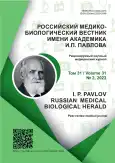Expression of FOXP3 of Tumor-Infiltrating Lymphocytes in Invasive Breast Cancer: Its Relationship to Histopathological Parameters and Overall Survival
- Authors: Hagone S.1, Bharat P.U.1, Gupta A.1, Nitin G.1
-
Affiliations:
- Mahatma Gandhi Institute of Medical Science
- Issue: Vol 31, No 2 (2023)
- Pages: 265-272
- Section: Original study
- URL: https://journal-vniispk.ru/pavlovj/article/view/252576
- DOI: https://doi.org/10.17816/PAVLOVJ108478
- ID: 252576
Cite item
Abstract
BACKGROUND: Forkhead box P3 protein (FOXP3) is expressed in both tumor cells and tumor-infiltrating lymphocytes (TILs) and is reported to be associated with differences in clinical outcomes. Recent literature shows that FOXP3 positive (FOXP3+) T regulator cells (Tregs) influence anti-tumor immunity in solid tumors.
АIM: To explore FOXP3+ Tregs expression related to various prognostic factors in breast carcinoma (BC) in the central Indian population. Our study is also helpful in correlating the role of FOXP3+ Tregs in the survival of invasive ductal BC with different histopathological presentations.
MATERIALS AND METHODS: This is a retrospective and prospective observational study in which FOXP3+ Tregs was counted in the peritumoral area by immunohistochemistry in 47 consecutive cases of BC operated on and diagnosed already. The patients were followed for 48 to 69 months for disease progression.
RESULTS: High-grade tumors are prevalent (n = 30) in the study area irrespective of the stage of clinical presentation. Patients who could adhere to their treatment plan remained free of adverse outcomes until the end of our follow-up period of 69 months (p = 0.001). No molecular subtype in our study showed specific predilection towards a high Tregs count in the peri-tumoral area. No other clinical or pathological parameters significantly correlated with FOXP3 +Treg count, including overall survival and disease-free survival.
CONCLUSION: The study shows that luminal human epidermal growth factor receptor 2 negativ and human epidermal growth factor receptor 2 enriched BC show comparatively high FOXP3+ Tregs count. There is no relation with tumor grade, TNM stage, important immune markers, or overall survival and disease-free survival.
Keywords
Full Text
##article.viewOnOriginalSite##About the authors
Swati Hagone
Mahatma Gandhi Institute of Medical Science
Email: drswatihagone@gmail.com
ORCID iD: 0000-0002-4674-3470
MD
India, MaharashtraPatil U. Bharat
Mahatma Gandhi Institute of Medical Science
Email: bharatpatil@mgims.ac.in
ORCID iD: 0000-0002-3364-4967
MD, Associate Professor
India, MaharashtraAnupama Gupta
Mahatma Gandhi Institute of Medical Science
Author for correspondence.
Email: anupamagupta@mgims.ac.in
ORCID iD: 0000-0001-5598-0331
MD, Professor
India, MaharashtraGangane Nitin
Mahatma Gandhi Institute of Medical Science
Email: nitingangane@gmail.com
ORCID iD: 0000-0003-0190-4215
MD, Professor
India, MaharashtraReferences
- Sung H, Ferlay J, Siegel RL, et al. Global cancer statistics 2020: GLOBOCAN estimates of incidence and mortality worldwide for 36 cancers in 185 countries. CA Cancer J Clin. 2021;71(3):209–49. doi: 10.3322/caac.21660
- Cancer Statistics — India Against Cancer [Internet]. Available at: http://cancerindia.org.in/cancer-statistics/. Accessed: 2022 June 02.
- Breast cancer treatment | breast cancer Hospital Delhi NCR, India | RGCIRC. Available at: https://www.rgcirc.org/specialties/department_surgical-oncology/breast-oncology-services/. Accessed: 2022 June 02.
- Chen Q, Lei JH, Bao J, et al. BRCA1 Deficiency Impairs Mitophagy and Promotes Inflammasome Activation and Mammary Tumor Metastasis. Adv Sci. 2020;7(6):1903616. doi: 10.1002/advs.201903616
- Pashayan N, Antoniou AC, Ivanus U, et al. Personalized early detection and prevention of breast cancer: ENVISION consensus statement. Nat Rev Clin Oncol. 2020;17(11):687–705. doi: 10.1038/s41571-020-0388-9
- Van Dooijeweert C, van Diest PJ, Ellis IO. Grading of invasive breast carcinoma: the way forward. Virchows Arch. 2022;480(1):33–43. doi: 10.1007/s00428-021-03141-2
- Curigliano G, Burstein HJ, Winer EP, et al. De-escalating and escalating treatments for early-stage breast cancer: the St. Gallen International Expert Consensus Conference on the Primary Therapy of Early Breast Cancer 2017. Ann Oncol. 2017;28(8):1700–12. doi: 10.1093/annonc/mdx308
- Qiu R, Zhou L, Ma Y, et al. Regulatory T Cell Plasticity and Stability and Autoimmune Diseases. Clin Rev Allergy Immunol. 2020;58(1):52–70. doi: 10.1007/s12016-018-8721-0
- Kalaw E, Lim M, Kutasovic JR, et al. Metaplastic Breast Cancers Frequently Express Immune Checkpoint Markers FOXP3 and PD-L1. Br J Cancer. 2020;123(11):1665–72. doi: 10.1038/s41416-020-01065-3
- Uva V, Sfondrini L, Triulzi T. FOXP3 expression in tumor cells and its role in cancer progression. Atlas Genet Cytogenet Oncol Haematol. 2015;19(3):234–9.
- Hong H, Gu Y, Zhang H, et al. Depletion of CD4 +CD25 + regulatory T cells enhances natural killer T cell-mediated anti-tumour immunity in a murine mammary breast cancer model. Clin Exp Immunol. 2010;159(1):93–9. doi: 10.1111/j.1365-2249.2009.04018.x
- Takenaka M, Seki N, Toh U, et al. FOXP3 expression in tumor cells and tumor-infiltrating lymphocytes is associated with breast cancer prognosis. Mol Clin Oncol. 2013;1(4):625–32. doi: 10.3892/mco.2013.107
- Liu S, Foulkes WD, Leung S, et al. Prognostic significance of FOXP3+ tumor-infiltrating lymphocytes in breast cancer depends on estrogen receptor and human epidermal growth factor receptor-2 expression status and concurrent cytotoxic T-cell infiltration. Breast Cancer Res. 2014;16(5):432. doi: 10.1186/s13058-014-0432-8
- Koletsa T, Kotoula V, Koliou G–A, et al. Prognostic Impact of Stromal and Intratumoral CD3, CD8 and FOXP3 in Adjuvantly Treated Breast Cancer: do They Add Information Over Stromal Tumor-Infiltrating Lymphocyte Density? Cancer Immunol Immunother. 2020;69(8):1549–64. doi: 10.1007/s00262-020-02557-0
- Lee S, Cho EY, Park YH, et al. Prognostic impact of FOXP3 expression in triple-negative breast cancer. Acta Oncol. 2013;52(1):73–81.doi: 10.3109/0284186X.2012.731520
- Papaioannou E, Sakellakis M, Melachrinou M, et al. A standardized evaluation method for FOXP3+ Tregs and CD8+ T-cells in Breast Carcinoma: Association with breast carcinoma subtypes, stage and prognosis. Anticancer Res. 2019;39(3):1217–32. doi: 10.21873/anticanres.13232
- Mohamed MG, Sarwath H, Alqahtani S, et al. Foxp3 expression in breast cancer patient from Qatar : survival analysis. J Immunother Cancer. 2015;3(Suppl 1):O2. doi: 10.1186/2051-1426-3-S1-O2
- Peng G–L, Li L, Guo Y–W, et al. CD8+ cytotoxic and FoxP3+ regulatory T lymphocytes serve as prognostic factors in breast cancer. Am J Transl Res. 2019;11(8):5039–53.
- Asano Y, Kashiwagi S, Goto W, et al. Tumour-infiltrating CD8 to FOXP3 lymphocyte ratio in predicting treatment responses to neoadjuvant chemotherapy of aggressive breast cancer. Br J Surg. 2016;103(7):845–54. doi: 10.1002/bjs.10127
- Kim S, Lee A, Lim W, et al. Zonal Difference and Prognostic Significance of Foxp3 Regulatory T Cell Infiltration in Breast Cancer. J Breast Cancer. 2014;17(1):8–17. doi: 10.4048/jbc.2014.17.1.8
Supplementary files








